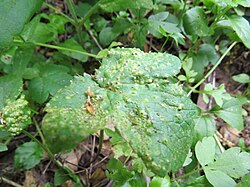Biology:Physodermataceae
| Physodermataceae | |
|---|---|

| |
| Physoderma pluriannulatum | |
| Scientific classification | |
| Domain: | Eukaryota |
| Kingdom: | Fungi |
| Division: | Blastocladiomycota |
| Class: | Physodermatomycetes Tedersoo et al. |
| Order: | Physodermatales Cavalier-Smith |
| Family: | Physodermataceae Sparrow |
Physodermatacae is a family of chytrid fungi in the order Physodermatales.[1] Species in the family have a parasitic relationship with the host's physoderma. This family is distinctive in that it contains a thick wall around the sporangia to resist against unfavorable conditions.[2] Sporangia releases from a host plant when rotting, dispersal is carried through the air.[3] This family is not to be confused or related to basidiomycetes rusts and smut fungi. This parasite is distributed all across the world in aquatic, semi aquatic wetlands and in some ferns.[4]
Physodermatacae breaks into two distinguished clades: Physoderma and Urophlyctis, which are grouped together because of the similar algal parasite called Paraphysoderma.
References
- ↑ "Physodermataceae". Species 2000: Naturalis, Leiden, the Netherlands. https://www.catalogueoflife.org/data/taxon/625M3.
- ↑ Lange, Lene; Olson, L. W. (1 June 1980). "Transfer of the physodermataceae from the chytridiales to the blastocladiales" (in en). Transactions of the British Mycological Society 74 (3): 449–457. doi:10.1016/S0007-1536(80)80043-X. ISSN 0007-1536. https://www.sciencedirect.com/science/article/pii/S000715368080043X.
- ↑ "Physodermataceae – Plant Parasites of Europe". https://bladmineerders.nl/parasites/fungi/blastocladiomycota/physodermataceae/.
- ↑ Porter, Teresita M.; Martin, Wallace; James, Timothy Y.; Longcore, Joyce E.; Gleason, Frank H.; Adler, Peter H.; Letcher, Peter M.; Vilgalys, Rytas (1 April 2011). "Molecular phylogeny of the Blastocladiomycota (Fungi) based on nuclear ribosomal DNA" (in en). Fungal Biology 115 (4): 381–392. doi:10.1016/j.funbio.2011.02.004. ISSN 1878-6146. PMID 21530920. https://www.sciencedirect.com/science/article/pii/S1878614611000250.
Wikidata ☰ Q10631036 entry
 |

